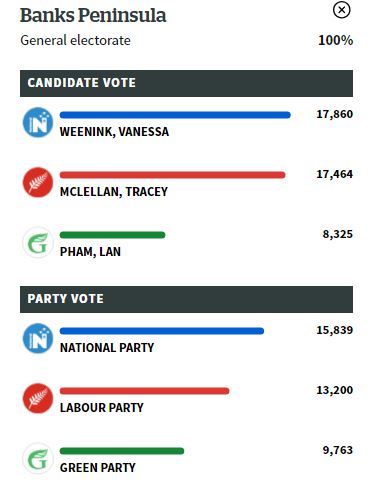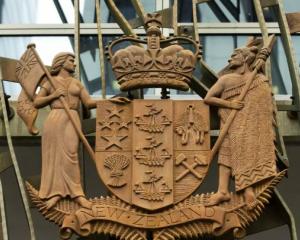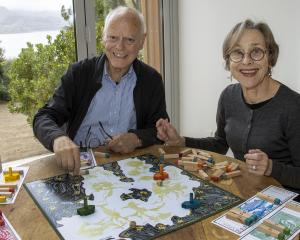
The final results see National losing two seats compared to election night on October 14 - and with it the slim one-seat majority it held with Act.
While National dropped two seats overall it also lost two electorate seats to Labour candidates, meaning former Ilam MP Gerry Brownlee will just scrape in on the list.
Vanessa Weenink has been confirmed as Banks Peninsula MP after leading Labour’s Tracey McLellan on election night.
National’s Weenink held a tight 83-vote election night lead over McLellan. But that margin was extended to 396 after the special votes were counted.

In other major results, Te Pāti Māori recorded its best-ever result, taking another two Māori electorate seats off Labour in Te Tai Tonga and Tāmaki Makaurau, meaning they won six of the 11 electorates.
Their result means Parliament will have a two-seat overhang, as they won more electorate seats than through their share of the party vote (3 percent), with another seat to be added after the Port Waikato by-election making up 123 seats.
This would mean 62 seats would be needed to form a majority.
On the final results released today, National dropped two seats from 50 on election night to 48, while Act remained on 11. This gave the two parties 59 seats together, meaning another three seats would be needed to form a government.
This result brings NZ First into the picture as a potential kingmaker - the party remains on the eight seats it recorded on election night. Together the three parties would have 67 seats, with another seat likely to be added with National’s Andrew Bayly the favourite to win the Port Waikato by-election.
National leader Christopher Luxon has been in negotiating talks with both Act’s David Seymour and NZ First’s Winston Peters in preparation for such a result.
The final results saw Te Pāti Māori gain another two seats compared to election night to record a historic result, their best since 2011 when they won five seats.
Takutai Tarsh Kemp beat Labour’s Peeni Henare by just 4 votes, overturning what was a 495-vote deficit on election night.
In an even more stunning result, Te Pāti Māori’s Mariameno Kapa-Kingi gained a majority of 517 over Labour’s Kelvin Davis in Te Tai Tokerau, overturning a 487-vote deficit on election night.
Labour remains on 34 seats, winning 17 electorates and with 17 list MPs.
In other seats, Labour’s Rachel Boyack secured Nelson by just 29 votes after trailing National’s Blair Cameron by 54 votes after the initial count.
Labour’s Phil Twyford, who trailed National’s Angee Nicholas in Te Atatū by just 30 votes, has come out ahead by 131.
All other seats have remained with the candidates who won them on October 14.
Party votes:
- National: 38.06 percent
- Labour: 26.1 percent
- Green Party: 11.6 percent
- ACT: 8.64 percent
- NZ First: 6.08 percent
- Te Pāti Māori: 3.08 percent
The turnout for special votes was larger than initially expected, with 603,257 special votes cast (20.9 percent of the total 2,883,412 votes cast) compared to the roughly 570,000 the Electoral Commission projected.
This makes for a turnout of 72.8 percent of enrolled voters, which compares to 82.2 percent in 2020 and 79.8 percent in 2017. However, enrolment was up to 94.7 percent, marginally higher than previous years.
With some of the final electorate results so close, recounts are possible - with applications required to be filed by next Wednesday, 8 November.
- additional reporting RNZ













